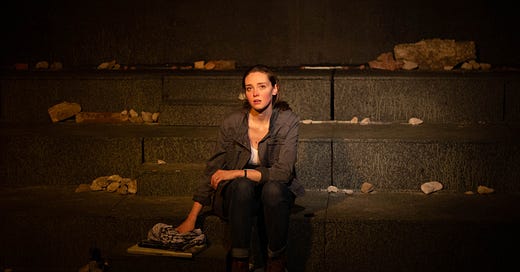SR review: “My Name Is Rachel Corrie” at Jacaranda Collective
The solo play about the fallen American activist gets a storefront staging at a remarkably fraught moment
Theater review by Kris Vire

In 2006, the New York Theatre Workshop caused a ruckus by first planning, then canceling, the U.S. premiere of My Name Is Rachel Corrie, the theater piece inspired by the life and death of a young American woman who was killed in Gaza in 2003. Rachel Corrie was a 23-year-old college student from Olympia, Washington, who journeyed to the Middle East as part of a Palestinian-aligned “human shield” group. She allegedly placed herself between an Israeli bulldozer and a Palestinian home; whether or not the bulldozer operator saw her remains a crux of dispute.
The one-actor play, constructed by British actor Alan Rickman and Guardian journalist (now that paper’s editor-in-chief) Katharine Viner from writings Corrie’s family granted them access to—ranging from elementary-school journals to email correspondences with her parents days before her death—premiered at London’s Royal Court Theatre in 2005 to much acclaim. But it proved too controversial for NYTW in the spring of 2006, leading to media coverage far outside of usual arts outlets.
Jacaranda Collective, a new Chicago storefront outfit that chose My Name Is Rachel Corrie for its debut production, may have chanced upon an even more fraught moment to mount this piece. Jacaranda’s staging opened last weekend at the Den Theatre just as the conservative American Israel Public Affairs Committee was holding its annual to-do; at the approximate midpoint of the Trump presidency; in the wake of accusations of anti-Semitism against freshman Congresswoman Ilhan Omar, who is Muslim; and as the enormous field of 2020 Democratic presidential candidates were tentatively staking out positions on the U.S.–Israel–Palestine question.

I hadn’t previously seen Rachel Corrie, but as it turns out, the play should only prove objectionable to those who conflate criticism of Israeli policy with criticism of the Jewish people—which, as has been recently reinforced, many people will. And Rachel even acknowledges as much in the text: “The scariest thing for non-Jewish Americans talking about Palestinian self-determination is the fear of sounding anti-Semitic,” she says. “The people of Israel are suffering and Jewish people have a long history of oppression. We still have some responsibility for that, but I think it's important to draw a firm distinction between the policies of Israel as a state, and Jewish people. That's kind of a no-brainer, but there is a very strong pressure to conflate the two. I try to ask myself, whose interest does it serve to identify Israeli policy with all Jewish people?”
That’s admirably nuanced thinking for an undergrad with no formal political education, you may be thinking, but it doesn’t sound like great drama. And on that, you’d be correct. But then, Rachel never knew her words would be spoken on stage.
What Rickman and Viner created is an empathetic portrait of a nascent chronicler who never got to fulfill her promise. The first half of the text they mined is taken from Corrie’s adolescent writings, establishing her as a normal teenager with a shy but poetic bent. Even as she moves into college and discovers newly political impulses, Viner and Rickman gave equal time to her moony insecurities, her petty musings on an ex-boyfriend’s new love interest, her youngest-sibling doubts about her convictions.

Her observations on the ground in Jerusalem and Gaza aren’t terrifically nuanced, true. But they’re sincere. She describes her bewilderment at what she sees—IDF soldiers bulldozing homes and greenhouses, instituting punitive-seeming checkpoints, and poisoning wells—and her inability to reconcile the Israeli offensive with the Palestinian people she sees making the effort to go about their lives.
But we never hear directly from any of those Palestinians, or their Israeli counterparts, making My Name Is Rachel Corrie unsatisfying as a piece of theatrical journalism. But as a portrait of a young girl who actually acted on her impulse to improve the world, it’s compelling.

That’s especially true in Jacaranda’s bare-bones but highly moving production, driven by a luminous and truthful performance from Halie Robinson, embodying Corrie’s smarts and shortcomings in wholly relatable fashion.
Is the play one-sided? Sure. But the side isn’t Israeli or Palestinian, it’s Rachel Corrie’s, and it’s entirely, tragically earnest.
My Name Is Rachel Corrie
Jacaranda Collective at The Den Theatre (1331 N Milwaukee Ave). Taken from the writings of Rachel Corrie. Edited by Alan Rickman and Katharine Viner. Directed by Sam Bianchini. Cast: Halie Robinson (Rachel Corrie). Designers: Emily Smith (scenic), Madeline Pell (lighting).
Running time: 1 hour 40 minutes; no intermission. Through April 6. Tickets ($25) at jacarandacollective.com.
Photographs by Zeke Dolezalek
Thanks for being an early Storefront Rebellion paid subscriber!
If someone forwarded you this email, and you’d like to support independent, ad-free coverage of Chicago theater, you can sign up as a subscriber right now for 20% off the regular price.
Send your feedback and tips to kris@krisvire.com.



